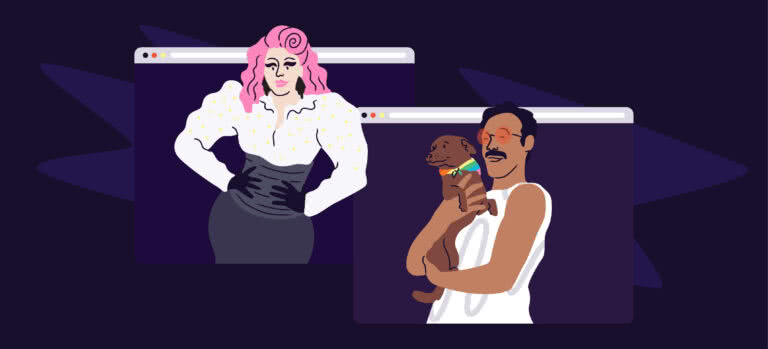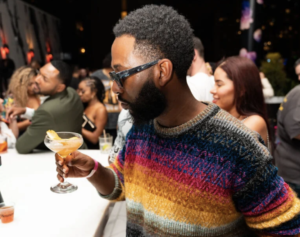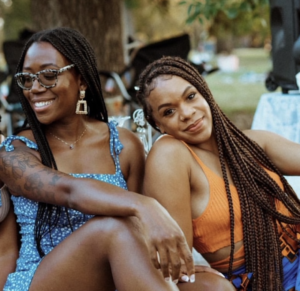More than half a century after the first brick was thrown at Stonewall, it’s easy to forget that the first Pride was a riot. Before this era of widespread social acceptance, members of the LGBTQIA+ community had to fight for their right to exist. But, no matter the decade, Pride has always been about community. Even the narrative around coming out is rooted in leaving isolation and finding togetherness. The current pandemic, however, has put an end to large gatherings, severely impacting the look and feel of 2020 Pride.
Thankfully, queer event creators are finding new ways to come together. “If there’s one thing you would say [about] our community, it’s that we’re a resilient bunch,” says Steve Taylor, a board member of the European Pride Organisers Association. “We have also been through this type of experience before with HIV/AIDS back in the ’80s and ’90s.”
Taylor’s team was behind Global Pride 2020: a 24-hour event that celebrated LGBTQIA+ people across the world. Pride planning usually begins at least a year before the event, but Taylor and his team had a much smaller organisation window this time round. “We began a discussion two months ago about having a global online Pride that would take content from Prides all over the world, merge that together, and broadcast on YouTube,” he explains. “We didn’t quite expect that, two weeks before the event, we would be announcing Joe Biden, Justin Trudeau, and world-leading A-list artists” would be appearing.
Taking the fun online
Despite global support, there’s no doubt that the queer community is finding the current situation difficult. The spaces they turn to for joy and solace are closed, and the impact of COVID-19 on nightlife has left many artists, performers, and waiting staff out of work. (All of these are areas that LGBTQIA+ people are highly represented in.) But many have found innovative ways to bring their community events online.
Female drag queen Ginger Phlappage runs a series of drag entertainment events in Shoreditch. While some of her events – like Lady Gala Bingo – are difficult to translate to the digital world, she’s found success with Drag Aerobics. The Instagram and Facebook Live classes, hosted by Dolly Trolley, have proved to be a big hit with people tuning in from all over the world.

“It gets you out of that lockdown funk that you get yourself into sometimes,” Phlappage says, adding: “People dress up for it. They get into drag themselves … and they say it’s something that they look forward to each week.” The pair have even raised £1,000 for the Black Lives Matter movement. “It has brought a community together and it’s been really lovely to be a part of that,” Phlappage states.
Educating generations
Although Pride’s main events have been cancelled, Phlappage feels that this year’s celebrations will be more authentic than ever. “People are educating themselves much more on why Pride was Pride. It wasn’t necessarily a fun thing to put on a glittery outfit,” she notes. “It was a riot. It was people fighting for their rights to be able to exist in the world like everyone else.”
Moving events online has opened people’s eyes in a number of ways. For Phlappage, it’s resulted in a much younger audience than she’d get on a Saturday night in Shoreditch. Parents will often take part in the online classes with their little ones. “For some kids, it’s their first experience with drag,” Phlappage says. “Seeing an LGBT person doing classes, it’s a really nice way of putting that out there.”
In fact, today’s celebrations are far more family-friendly. Gabrielle Griffith, who runs drop-in sessions for queer parents and caregivers in Toronto, explains the importance of getting young people involved: “When you teach somebody from a young age that we may be different, and you treat people different, it’s going to have a domino effect in our society in the future. There’s gonna be less transphobia, less judgement, and less bullying towards folks with different sexualities or genders.”
Griffith’s community, Seed & Sprout – which is funded by doula organisation Birth Mark– has turned physical sessions into virtual meet-ups. It also celebrated Pride in the comfort of people’s homes with the Virtual Family Pride Dance Party. After an hour of music and fun, the event transitioned into a breakout panel that discussed the importance of Family Pride and the many ways people celebrated it.
These online events have shown Griffith the many ways “that we can engage and connect with our community.” It’s resolved accessibility issues for members of the community who don’t have access to a car, can’t use public transport, or who simply don’t want to travel during the day.
Digital Pride is here to stay
The celebrations may look a bit different this year, but the outlook is optimistic. As Taylor says: “We’re resilient, we get on with things, and we find a way through.” Phlappage, meanwhile, says she’s “very excited about the noise that’s happening at the moment” despite many still living in lockdown.
So will Pride creators continue hosting events online after the COVID-19 restrictions have been lifted? Taylor certainly thinks so. “You can reach people who, for whatever reason, don’t feel able to go to a physical Pride,” he says. And with Copenhagen Pride trialling technology like augmented reality (AR), Taylor believes that far more event creators will try different – and more inclusive – ways to deliver Pride in 2021 and beyond.





